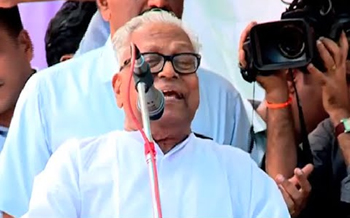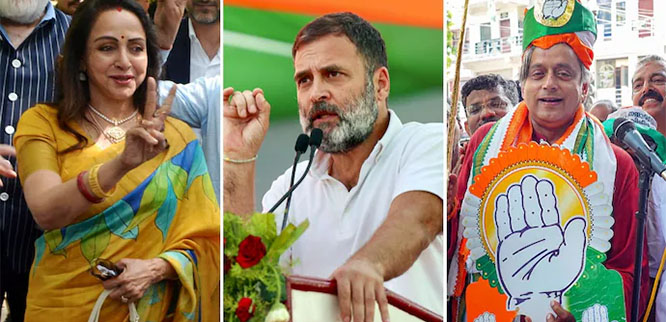Malampuzha, (Ker), Apr 28: The 93-year-old CPI(M) warhorse and former Kerala Chief Minister V S Achuthanandan is all set for another round of electoral battle to retain his seat at Malampuzha, where he is pitted against Congress's 29-year old V S Joy for the May 16 Assembly polls.

Braving the scorching summer, Achuthanandan, popularly known as 'VS', has already addressed a series of meetings in the constituency in Palakkad district, considered the state's industrial corridor.
Throughout his campaign, he has attacked the Congress led UDF, taking on Chief Minister Oommen Chandy by raking up the corruption issues related to solar, bar bribery scams and the 'communal and divisive' politics of BJP-NDA.
The fight has turned out to be a fierce one for all, as both Congress led UDF and BJP-NDA are trying hard to inflict maximum damage to Achuthanandan's poll prospects.
The presence of BJP's C Krishnakumar, vice-chairman of Palakkad Municipal Corporation, the only civic body the party controls in the state, has virtually made prediction of poll outcome a difficult task, political observers feel.
Besides, Bharat Dharam Jana Sena,the new partner of BJP, formed by Sree Narayana Dharma Paripalana Yogam General secretary Vellapally Natesan, is also very active in the segment.
Natesan is itching to get even with Achuthanandan as it was he who had taken up alleged irregularities in the micro finance scheme run by SNDP and had also attacked Natesan for his alliance with the saffron party in the state.
The state government had initiated a Vigilance probe into the charges against Natesan, based on the complaint of VS.
Achuthanandan's victory margin has steadily increased since 2001 when he contested in the constituency for the first time. He won by a margin of 4,703 in 2001, in 2006 by a margin of 20,000 and in 2011 by 23,440 votes.
India's seniormost Communist leader, Achuthanandan is the only surviving comrade among those who walked out of undivided CPI to form CPI(M) after the ideological schism shook the Indian Left movement in the early 1960s.
After being essentially an organisation builder for much of his career holding key posts like the state secretary, what metamorphosed Achuthanandan into a mass leader was his stint as opposition leader during 2001-06.
Achuthanandan, who hails from Punnapara in Alappuzha district, before switching his constituency to Malampuzha, was earlier elected to the assembly from Ambalappuzha 1967 and 1970 and from Maraikkulam 1991.
An 'old school Marxist' for those outside CPI(M), Achuthanandan's inner-party rivals have often accused him of being the prime source of long-drawn factional trends in the state unit.
This virtually led to his upset defeat, allegedly due to the perfidy of the opposing faction, in the 1996 assembly polls in his home segment Mararikkulam, when he was widely projected as the Chief Ministerial candidate.
On the other hand, Congress candidate Joy during his 'Kudumba Mela' (family gatherings), is focusing on development initiatives of the five-year rule of Chandy government and seek continuation of the UDF government.
Joy said his aim was to rewrite the history of Malampuzha, which has stood with the Left so far.
Joy is also taking up several local issues of the people such as lack of drinking water in many parts of the segment, comprising Akathethara, Elappully, Kodumba, Malampuzha, Marutharoad, Mundur, Pudussery and Puduppariyaram Panchayats in Palakkad taluk.
Local people complain that Achuthanandan, who most of the time resides in Thiruvananthapuram, either as Opposition leader or Chief Minister, has not brought about any major development work in the constituency, while LDF has strongly disputed the charge.
54-year old Krishnakumar attacks both UDF and LDF and focuses on the development and welfare initiatives started by the Modi government.
"The environment problems in the constituency is one of the highlight of the campaign", Krishnakumar said.
The recent incident of alleged insult to a Dalit woman, principal of the Government Victoria College, by activists of CPI-M student wing Students Federation of India (SFI) is also being taken by the BJP to attack LDF.
"It is a clear case of intolerance on the part of CPI-M", Krishnakumar said.
The students had prepared a 'grave' as a retirement gift to the principal. The incident had evoked widespread protest.
The importance the saffron party attaches to the constituency can be gauged from the fact that Prime Minister Narendra Modi will start his poll campaign in Kerala from Palakkad on May 6.








Comments
Add new comment